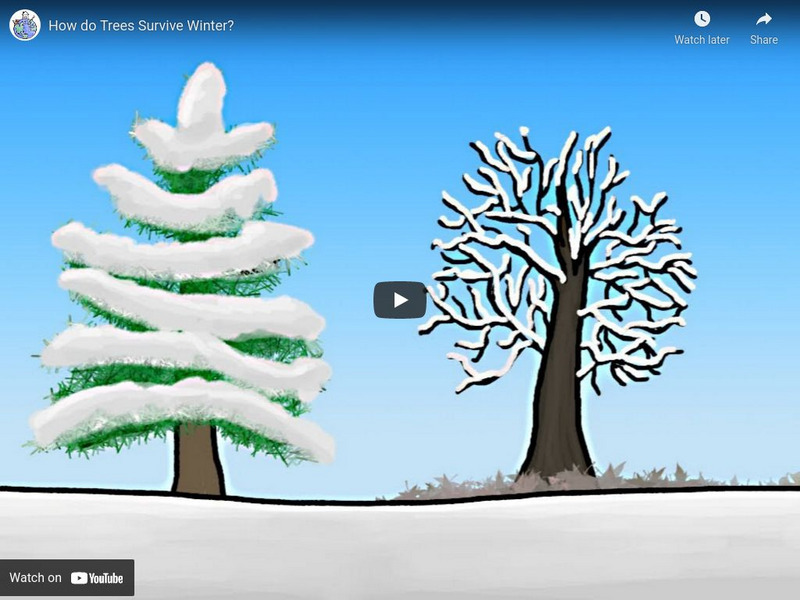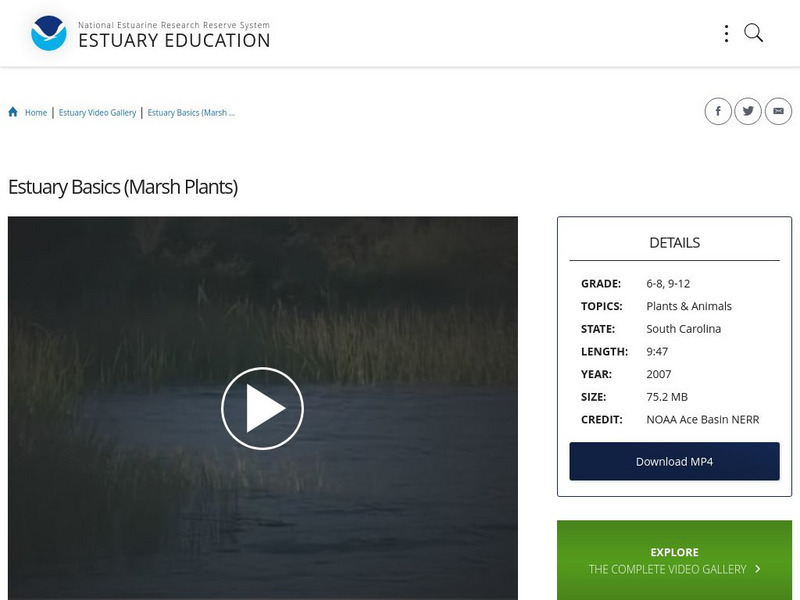Amoeba Sisters
Plants: Diversity, Structure, & Adaptations
Join the Amoeba Sisters in their updated plant structure and adaptations video as they discuss the terms vascular vs nonvascular and how they relate to plants before exploring some general categories of plants (bryophytes, seedless...
Visual Learning Systems
Adaptations: Surviving in Different Environments
This video discusses the concept of adaptations in living things. It highlights examples such as alligators needing warm climates, cacti not being able to survive in snowy environments, and birds having wings for flying. Adaptations part...
TED-Ed
The Amazing Ways Plants Defend Themselves
Plants can't run away from their predators, so they develop unique ways to defend themselves. The video presents many different defensive techniques that plants use. It also discusses how animals respond to these traits.
Bozeman Science
Plant and Animal Defense
Explain the defense systems of both plants and animals against pathogens with a biology video. It covers the disruption of the immune system through hypersensitive responses, normal responses, nonspecific immune responses, as well as the...
TED-Ed
How Plants Tell Time
Can someone really have a "biological clock"? Discover why many organisms on earth have an inherent awareness of where they are in the day's cycle.This video discusses animal adaptations, the earth's revolutions, and how light and...
PBS
Seasonal Science: Venus Flytrap
Over 600 species of carnivorous plants exist. A Seasonal Science video discusses one of the most recognizable, the Venus flytrap, Viewers learn how the plant determines which bugs to eat, which to allow to pollinate, and much more.
Be Smart
Do Plants Think?
Plants react to many different stimuli, but do they think? After many years, scientists now have a definite answer. A video shares the theories and facts as part of a larger biology playlist. From plants listening to music to plants...
Deep Look
These 'Resurrection Plants' Spring Back to Life in Seconds
Without water, mosses dry out and stop photosynthesizing, essentially dying. However, with the first drop of rain, even after 100 years, they instantly come to life and grow. The video explains the benefits of this behavior and what...
Deep Look
This Mushroom Starts Killing You Before You Even Realize It
Death cap mushrooms cause the most fatal mushroom poisonings worldwide. The video explains where they grow, how the toxin works, and how our bodies react to eating them. Then, it offers a glimpse into the research scientists are doing to...
MinuteEarth
Why Does Wine Make Your Mouth Feel Dry?
Examine a plant adaptation that deters animals from eating it. Some plants such as grapes, walnuts, and teas produce a chemical substance called tannin in its fruits and leaves because most animals dislike the texture and flavor. An...
MinuteEarth
The Real Reason Leaves Change Color in the Fall
Discover the chemistry behind the color change in leaves. The lesson narrator describes how trees must recycle nutrients in the leaves before they fall off for the winter. The video breaks down the process and highlights the chemistry of...
MinuteEarth
How Do Trees Survive Winter?
Explore trees' strategies for surviving winters in cold climates. The first trees were built for tropical climates. As they migrated to colder climates, they adapted the capability to survive the harsher weather. The video lesson...
Bozeman Science
Plant Control
The ethylene gas emitted by the apple or banana helps to ripen a fruit when in close proximity. A helpful video explains how plants attempt to control their environment through hormones. It focuses on five specific hormones: auxin,...
Crash Course Kids
Planetary Plants
Since plants are the main source for all life on Earth, that would mean there would have to be plants on other planets to support life. This is the focus of a video that explores how plants could exist on planets other than Earth.
Crash Course Kids
Living Things Change
What happens to organisms when the environment around them changes? This is the focus of a video that describes how living things must adapt to their ever-changing environment.
Curated OER
Desert Plants and Cactus
Plants have unique ways of adapting to droughts. Show your class this video to highlight some of the many adaptations desert plants have adopted over time.
Curated OER
Plant Growth of Tropical Flowers in the Desert
Can you imagine the desert floor being covered by bright, vibrant flowers? Watch the desert plants transform from dry and crisp to dazzling and colorful in this video. Use as an introduction to desert pollination or to present the...
Curated OER
Desert Cacti
Did you know that the saguaro cactus can live for up to 200 hundred years? Learn more about this specialized cactus by showing this short, informational video clip set in the Sonoran Desert, the only desert where saguaros can live!
Curated OER
How the Quiver Tree Survives in the Desert
Did you know there's a desert tree that can perform self-amputation to reduce the amount of water it needs? Use this video clip to introduce your class to the ways different plants adapt to a hard desert environment.
Minute Earth
Minute Earth: How Do Trees Survive Winter?
Learn about some survival mechanisms that allow plants to survive in cold climates. [2:49]
Minute Earth
Minute Earth: The Secret Social Life of Plants
Plants are more than just green, photosynthesis machines. They behave and adapt to their environmental cues much like animals do. [2:32]
NOAA
Noaa: Estuary Education: Estuary Basics (Marsh Plants)
Meet scientist Saundra Upchurch of the Ace Basin Reserve and learn about the marsh plants of South Carolina's "Low Country." [9:43]




















